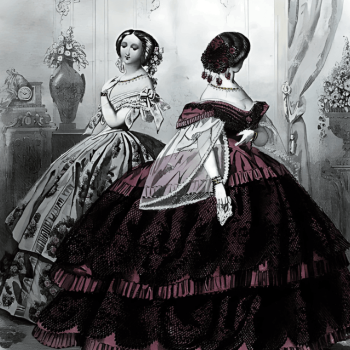REASONING
April 1841
On the occasion of the holidays, lessons had not yet begun. The girls sat upstairs in their classroom, near Baba Lena’s office, where the door was open. They were inspecting all the pretty little things Gorov had given them the day before.
“Lelya,” asked Vera, “why did Gorov say that he didn’t dare ask for Dede Andrushka when he called us all to the Christmas tree?”
“What don’t you understand?” Lelya replied. “A simple merchant would not dare call on the governor, and Dede Andrushka, is, after all, the Governor!”[1]
“What is that? What is a Governor?”
“The governor is the most important person in the province.”
“What’s a province?”
“You don’t know what a province is?” said Lelya with annoyance. “A province is made up of thirty or forty cities and several thousand villages.”
“That many? So Dede Andrushka is important?”
“Very important.”
“Who is more important than him? Is the Tsar more important?
“God! What a fool! There are a million governors in Russia, but only one Tsar!”
“Really? How much is a million?”
“A million?…Well, that’s a lot… a lot… anyway, you won’t be able to count!”
“Well, besides the Tsar, who else is more important than Dede Andrushka?”
“Well,” said Lelya, after thinking for a second, “the minister is more important.”
“Who is he? Who is this minister?”
“My God, Vera! ‘Who is this?’” Lelya replied. “You are terribly stupid. A minister is a minister, that’s all!”
“Where does the minister live?”
“In St. Petersburg, with the Tsar. There are a lot of them there. They are all counts and princes. They control everything.
“How?”
“What a fool!” said Lelya, now completely angry. “Everything is controlled. Leave me alone!”
“Is there such a minister here?”
“No!”
“So, who is more important here than Dede Andrushka?”
“I already told you! There is no one here more important than Dede Andrushka. He is the most important!”
“What are you talking about, children?” rang Baba Lena’s voice suddenly out from her room. “Who is in charge?”
“I said that here, in Saratov, there is no one more important than Dede Andrushka,” Lelya answered, blushing but bravely.
“What does this have to do with you, children?”
“Verochka asked why Gorov said that he didn’t dare invite Dede Andrushka.”
“Well, what did you answer her?”
“The truth,” said Lelya in a rather embarrassed voice. “It is because Dede Andrushka is the governor, and Gorov is a simple merchant!”
“What nonsense you are talking about!” said Baba Lena, calling her grandchildren to her office. She took Lelya’s hand and corrected her affectionately, but very seriously. “How many times have I asked you, Lelya, not to talk about what you don’t understand? It is shameful and very stupid!” said Baba Lena. “Yet what did you just say? What do you mean by ‘a simple merchant?’ So ‘Gorov is a simple merchant’ is that right? Well then, Dede Andrushka is a ‘simple governor.’ What difference does it make? Both of them are human. Now, if Gorov was a bad merchant or Dede Andrushka was a bad Governor, then it would matter because it is sinful and shameful to be bad people! If both are good, honest people, then it makes absolutely no difference whether they are a gentleman, a merchant, or a peasant. One cannot choose what station one is born into in life, but one can choose to be kind and understanding. It is far better to be a good peasant than a wicked gentleman. Why, for example, would you be proud in front of Masha that you were born a young lady, and she was born a maid? And yet you are proud! I heard you tell her yesterday that she should respect you because you are a young lady. Do you think this is from your merit? She does not have to respect you for this, Lelya. On the contrary, you should respect her! She is such a good, dutiful girl, who cares so much about you, and serves you so well. I know you do not want to hear this, but she is much older and smarter than you. When you grow up and become smarter, then you can demand respect. In the meantime, be grateful that you are loved and forgiven for your stupidities and shortcomings. What you told Verochka just now is nonsense!” Baba Lena tenderly pulled the girls close to her and gave them big kisses. “Gorov only said that he did not dare to invite Dede Andrushka, because he knew how busy he was.”
Then Helena Andreevna, Aunt Katya, and Aunt Nadya came in, and Baba Lena told them of their conversation.
“They say old woman Gorova is an Old Believer,” said Aunt Katya, but Old Believers don’t eat with Orthodox Christians.”
“That’s right,” said Baba Lena. “That is why she didn’t come to the hall.”
“What is an Old Believer?” asked Vera.
“You know that Christ lived on earth a very long time ago, when no one spoke Russian yet,” Baba Lena said. “Those people who were the first to write about Him, how He was born, suffered, and died crucified on the cross, wrote in the languages that were spoken then, like Greek, Hebrew, and Latin. Well, all the other peoples began to translate holy books and prayers into their own languages, as was the case for us Russians. But we Russians did not translate well and made a lot of mistakes that had to be corrected later. One smart, very learned man, Patriarch Nikon, corrected all the mistakes and ordered the printing of other books that were already correctly translated from the Greek prayer books.”
“Why Greek?”
“Because we adopted our faith from the Greeks,” said Baba Lena. “When you get a little older, you will learn about it.”
“Ok.”
“So we all began to read prayers and serve in churches using the books issued by Patriarch Nikon. However, some uneducated, poor people, did not believe that Patriarch Nikon simply corrected an erroneous translation. They believed that he completely remade them! They thought that he composed his own prayers, and invented a new faith altogether.”
“So, what did they do?”
“Well, they began to say that it was a sin to pray using these new books and that we must stick to the books. This is why they called themselves ‘Old Believers,’ as it indicated that they believed in the old way, and unlike us, the Orthodox, who, in their opinion, invented a new faith for ourselves.”
“But that’s not true, is it?”
“It is not true at all!” said Baba Lena reassuringly. “In essence, both we and they believe in the same God, Jesus Christ, and all the saints. The Old Believers are completely mistaken in considering us infidels of the old, true faith. We must hope that these poor, simple people will understand their mistake when they study more, and all of us Russians will believe the same, pray the same, and glorify God together again in our Orthodox churches.”[2]
-
- MOTHERS & DAUGHTERS
- A LANTERN
- CHRISTENING OF THE DOLL
- DASHA & DUNYA
- GRUNYA
- NANNY NASTYA
- NANNY’S FAIRYTALE
- CONFESSION
- IN THE MONASTERY
- PREPARATIONS FOR THE HOLIDAY
- EASTER
- THE DACHA
- THE MELON POND
- MIKHAIL IVANOVICH
- THE WARLIKE PARTRIDGE
- LEONID
- NEW WINTER
- HISTORY OF BELYANKA
- THEATRES AND BALLS
- YOLKA
- REASONING
- ROAD
- CAMP
- IN NEW PLACES
- THE GRAY MONK
- VARENIKI
- THE TRIP TO DIKANKA
- WHAT HAPPENED IN THE DOLL HOUSE
- ANTONIA’S STORY
- “A WINTER EVENING”
- THE BLACK SEA
- CRIME AND PUNISHMENT
- PANIKHIDA
- PRINCE TYUMEN
SOURCES:
[1] In March Andrei Mikhailovich went to the Atkarsk and Kuznetsk districts, and on April 22, he set off for Zaporozhe. When crossing of the Volga, a storm arose and a strong gust of wind caused his boat to land on a spit, He was unable to resume his travels until night, after the storm died down, and he managed to get to the shore. Then he traveled far and wide to new settlements and places proposed for the founding of more new settlements in the Novouzensky and Nikolayevsky Districts. On the way back, when he was already approaching the banks of the Volga, not far from Khvalynsk, in the village of Ivantyevka, a courier from Saratov caught up with him with a notice of his appointment as Saratov Governor, with promotion to state councilor. Fadeev writes: “Three weeks after my appointment as governor, I received the Highest order to destroy the schismatic monasteries on the Irgiz and to convert them to the Old Believers. The government had been busy with this for a long time and, it seems, two governors had lost their positions for failure in this matter. Having looked into the matter, I have ascertained, and I believe without a doubt, that the main reason for their failure was their manner of approaching this matter. They, on receiving the Highest orders, set about the action with some solemnity, made great preparations, collected the troops quartered in the province, which consisted entirely of the worst garrison and invalid detachments, and, on arriving at the place, found the schismatics already gathered in the monasteries in thousands to defend their shrine, fully armed with their fanaticism, shouting, making noise, and deciding, according to their assurances, to lay down their lives rather than allow their shrine to be desecrated. The governors, having made some noise and shouted in their turn, did not dare to engage in battle with the peasants, who were, in their own way, quite well armed, and returned home without having accomplished the deed I decided to act differently. Having received the paper, I put it in my bosom. The very next day I found a pretext to go in the opposite direction, and halfway there turned towards the monasteries. Arriving quite unexpectedly at the monasteries, I gathered all the abbots and monks and announced to them the unchangeable Supreme will to destroy the monasteries, and gently suggested that if they resisted, a significant army would arrive, they would be forced to fulfill the Supreme will by force and would be subject to strict responsibility; whereas now, with obedience and submission, those who wished could convert to the Old Believers, and those who did not wish would be released to live wherever they wished, with certain conditions and even with assistance. This measure was a complete success. At first, some of the Old Believers, having learned what was going on, rushed to the bell tower to ring the bells and raise the alarm, but I, to prevent this attempt, immediately upon arriving at the monastery, sent two disguised gendarmes who were with me to the bell tower, ordered them to cut the ropes of the bells, which was done. At this failure, the schismatics were taken aback and offered no more resistance. In all three monasteries, the Old Believers were destroyed in one day, and they were immediately converted into co-religionist monasteries by an Orthodox archimandrite who came to me at the appointed hour, who performed the appropriate service in them and sprinkled everything with holy water. That was the end of this matter, which had lasted for decades and was considered almost hopeless. In the province and Petersburg they were amazed at such a quick success. The Tsar thanked me for this, and I returned to Saratov safely. Following this urgent matter, another no less significant one followed. In some districts, where, by order of the Ministry of State Property, by the Highest Command, potato sowing was to be carried out annually, some of the state peasants resolutely opposed it, regardless of any convictions. I was ordered to bring them to obedience and overcome the peasants’ stubbornness, no matter what. I immediately went to them. These peasants consisted almost entirely of schismatics and Mordvins, who lived in the wilderness. The Mordvins in particular, as a semi-savage people, were distinguished by their extraordinary stupidity and extreme obstinacy. All the convictions that were reiterated to them, with all possible patience and composure, had no success. A military detachment and artillery were sent with me just in case, but I firmly decided not to resort to the assistance of bayonets and cannons, which I counted on only as a more or less effective means for intimidating unreasonable people. The matter passed without bloodshed, although there were those who wanted it, urging me to let at least a couple of kernels into the unruly crowd. Everything ended with the punishment of several of the most stubborn rebels with rods, and that more for insolent expressions than for resistance to sowing. I ignored the stubborn enemies of the potato completely, expressing only regret for their stupidity and obstinacy. At the same time, I treated with kindness those who voluntarily expressed their consent to carry out the will of the government, encouraged with assurances of rewards those who expressed this consent with the visible intention of carrying it out; and having given orders that lists should be presented to me, both of those who were zealous in their execution and of those who were becoming stubborn in their obstinacy, I left them, at the same time removing from those places the military execution, which I had been ordered to leave there. Over the course of two or three years, potato sowing among the peasants became widespread in the state-owned villages, and some of the peasants, the most stubborn, turned out to be the ones who understood the benefits and advantages of this innovation, which they met with such hostility. In June, L. A. Perovsky, who was then managing the appanage estates, which were significant in the Saratov province, visited Saratov. Rumors were already circulating about his imminent appointment as Minister of Internal Affairs. It seems that already on this trip, he had developed a prejudice against me, inspired in him by the local appanage authorities: they reported to him that I was allegedly opposing the benefits of the appanage estates by limiting, during the special demarcation of the Zavolozhye Steppes that was then taking place, the seizures of land plots made by the appanage peasants in huge quantities. But I considered it my absolute duty to be guided in this case by the general order of the government, so that owners and settlers of all classes were allocated exactly the amount of land that was due to them, and no more. However, Perovsky did not tell me about this and did not express any displeasure, but I learned this later. He dined with me, seemed in a good mood, and was very kind to me and my family. In July and August, I began my travels to inspect the province, in my capacity as governor, first to the Khvalynsk and Kuznetsk districts, and then to the Atkarsk, Palashevsky, Kamyshinsky and Tsaritsynsky Districts. Everywhere I found a great deal of disorder from bad bureaucracy. I did what I could to reduce the evil, but, of course, I had little success. There was no hope that the bad officials could be replaced by better ones; the worst of them were certainly eliminated, but there was no way to eradicate the root of the evil. From autumn onwards, I was mainly engaged in large-scale recruitment. In December, I received an order from the new Minister of Internal Affairs, Perovsky, to arrive in Petersburg upon completion of the recruitment.”[Fadeyev, Andrei Mikhailovich. Vospominaniia: 1790-1867. Vysochaishe Utverzhd. Yuzhno-Russkago. Odessa, Ukraine. [Russian Empire.] (1897): Part I: 156-162.]
[2] Zhelihovskaya, Vera Petrovna. How I Was Little. A. F. Devrien. St. Petersburg, Russia. (1898): 162-169.













